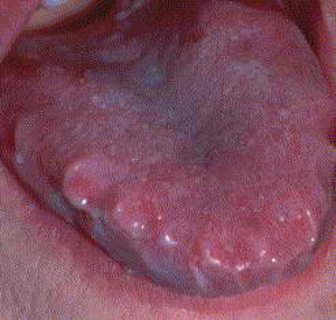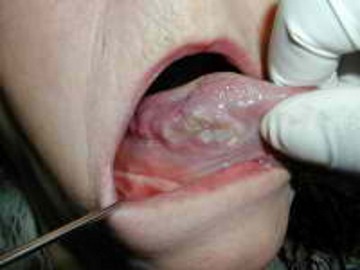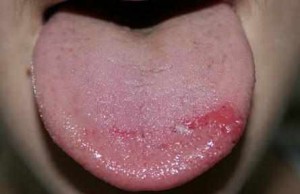Glossodynia – Treatment, Pictures, Symptoms, Causes
What is Glossodynia?
Glossodynia is otherwise termed as glossopyrosis which is a symptom that has a characteristic of a sensation of burning in the person’s tongue and it also affects the lips and the entire mouth region. Hence, it is also called as the burning mouth syndrome. The oral cavity becomes inflamed as well as infected. It is commonly reported in women who are in the age of 50 years old and above.
Most often also, the women who experience this kind of condition are entering their menopausal stage or period. Persons with this kind of symptoms do not have organic lesion which are identifiable. Their reports of discomfort are associated with psychogenic basis. Also, there are no visible clinical changes noted with persons having this kind of symptom. It is considered to be the most common of the oral problems there is. In addition to that, this is considered as a psychosomatic kind of disorder.

Sore mouth as one of the physiological symptoms of glossodynia
Glossodynia Symptoms
The person having Glossodynia will be able to manifest the following symptoms, which are associated with this kind of condition:
- Burning sensation in the oral cavity especially in the tongue
- Xerostomia or drying of the mouth
- Cotton mouth or lacking of saliva
- Dysgeusia which is the disorientation of taste wherein things doesn’t taste normally as it should be
- Depression
- Chronic anxiety
- Itching of the tongue
- Difficulty in swallowing
- Difficulty in chewing
- Changing in the person’s mood
- Mouth pain
- Difficulty in speaking
- Increase in thirst
- Mild discomfort in the oral region
- Sore mouth
- Numbing sensation of the mouth
The symptoms mentioned are usually not present in the morning but it eventually gets worse as the day goes on. In addition to that, symptoms may be present in other oral location. Also, the patient with this kind of condition will be able to experience remission and exacerbation of the condition which will last to a few months to years.

Physical assessment of patient who experiencing glossodynia
Image source: img.medscape.com
Glossodynia Causes
The causes or etiological factors that are associated with this symptom or condition may be as follows:
- Damaged nerves of the mouth especially upon dental extraction procedures
- Damage to the nerve particularly the lingual nerve
- Type 2 diabetes
- Nutritional deficiencies such as deficiency in pyridoxine, zinc, iron, folate, riboflavin, cobalamin, thiamin and the like which affects the oral tissues and lead to burning of the mouth
- Imbalance in the hormones which is associated to menopause which affect the saliva composition
- Cigarette smoking such as tobacco smoking
- Hyper acidity
- Oral cancer
- Persons with irritating dentures which put stress on tissues and muscles found in your mouth
- Sjogren’s syndrome
- Hypothyroidism
- Cancerphobia
- Trauma of the tongue
- Side effects of medications like medications for blood pressure control which results to burning of the mouth
- Oral disorders like dry mouth, geographic tongue or lichen planus
- Local infections like oral thrush or otherwise known as candidiasis
- Foaming agent which is found in household products like toothpaste
- Excessive irritation of the mouth which is a result in overbrushing of your tongue or perhaps over consumption of acidic rich foods or beverages and the like
- Psychological Factors such as depression, excessive worrying with regards to health or chronic anxiety and the likes
- Allergic reaction to food that was consumed, food flavorings, fragrances, dyes or other kinds of substances
- GERD or gastroesophageal reflux disease which results to the bitter taste fluid that comes from the upper gastrointestinal tract and goes to your mouth which results to pain and irritation
- Oral habits like thrusting of the tongue and grinding of the teeth or otherwise known as bruxism
Hence, to determine the exact causative factor and to allay fear, there is a need to visit or consult your trusted physician for further evaluation and for you to be able to undergo confirmative diagnostic examinations needed for this kind of condition.
Glossodynia Treatment
The treatment for patients diagnosed with Glossodynia varies from one person to another depending on the severity of the manifesting symptoms, as well as the diagnosis and the underlying etiological factors. Apparently, as of the moment, there is no specific treatment that will cure this kind of condition, however, treatment that will reduce the symptoms that the patient experience can be given and prescribed by a trusted physician. Such treatment includes:
- Mouthwashes
- Vitamin supplements which depends on the deficiency of the vitamin
- Alpha lipoic acid
- Oral thrush medication
- Antidepressant medication
- Vitamin B supplement
- Cognitive behavior therapy
- Psychological medications
- Saliva replacement therapy
- Pain reliever such as capsaicin, a known local anesthesia, which comes from chili peppers
- Oral rinses
- Anticonvulsant medication which is in lozenge form such as clonazepam
- Microsurgeries which are done for nerve damage or neuropathies
- Removal of the dentures or crowns
- Plastic tray will be fitted to be able to correct mouth irregularities
- Antibiotic kind of medication to prevent bacteria to lodge in
- Chamomile mouthwash to be used four or five times a day which improves the symptoms associated with this kind of condition
Aside from the ones which were mention, you can manage this kind of condition through having a good oral hygiene, stop smoking, drinking more fluids, engaging in regular healthy exercises, avoiding foods that are acidic kind, spicy, and alcoholic beverages.
